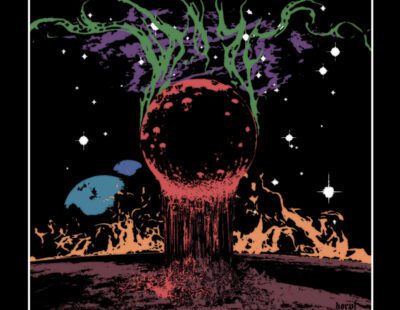
“It’s been 40 years since Horndal’s factory closed and our hometown got left for dead.”
Horndal, named after the band’s hometown in Sweden, has a story to tell us. In 1977, the town’s steel mill closed down, and the familiar demons took hold: poverty, unemployment, depopulation and despair. The sad irony of the Horndal mill closure is reflected in it’s fame among economists in the so-called “Horndal effect,” which represents displays of impressive boosts in productivity despite the winding down of operations and lack of investment. Regardless, the margins gained from producing steel at this particular plant weren’t enough to sustain it, and the town faced the blight so common among once-thriving industrial towns. Even with the guardrails afforded to Swedes through the power of trade unions and the benefits of social democracy, if a town’s economic raison d’être departs, there’s not much left for the people living there.
The band, for their part, seek to tell this story, as it’s not just the story of Horndal, but that of thousands of towns on both sides of the Atlantic. It’s the story of the post-war settlement disrupted by globalization, technological change, and labor arbitrage. And now with the band’s latest album, Lake Drinker, they’re ready to delve into the latest chapter: the arrival of big tech firms in the area, and the resulting environmental degradation — the false promise of the “information economy.”
It’s fertile ground for crushing metallic hardcore, something Sweden has always delivered like national industry. And while Horndal’s steel mill may be gone, the production line of riffs continues unabated. The song, “Horndal’s Blodbad” is taken from this new record, and Decibel is happy to present it to you today. Here’s how the band describes the song:
“This song is about what happens when there’s no one left to blame and nothing left to fight for — people start blaming and fighting each other. As the lyrics go — “Heads roll / blood spill / down at Berta’s bar n’ grill (Horndal’s only pub).
I think the song shows a new side of the band. A slower, heavier and spookier side. The eerie vibraphones, bells and glockenspiels are played by Pelle Jacobsson from the Swedish Radio Symphony Orchestra were recorded at Berwaldhallen in Stockholm (Sweden’s Royal Albert Hall), that we luckily got access to because of the pandemic — closed and empty.”
As for the video, the band brings in yet another vector of history, that of the plight of refugees coming to the west:
The video is based on photographs taken by Nina and Mitra, two Iranian refugees who now are in Horndal waiting for their residence permit. We found their photos on Instagram, got really touched by their story and reached out. It shows the journey from their childhood in Teheran, their way to Horndal, the tough and insecure time of being stranded here, not knowing what will happen next. Another side of our hometown. It’s rough, it’s real.
Enjoy the video and song below. Lake Drinker comes out on April 9 via Prosthetic Records.







